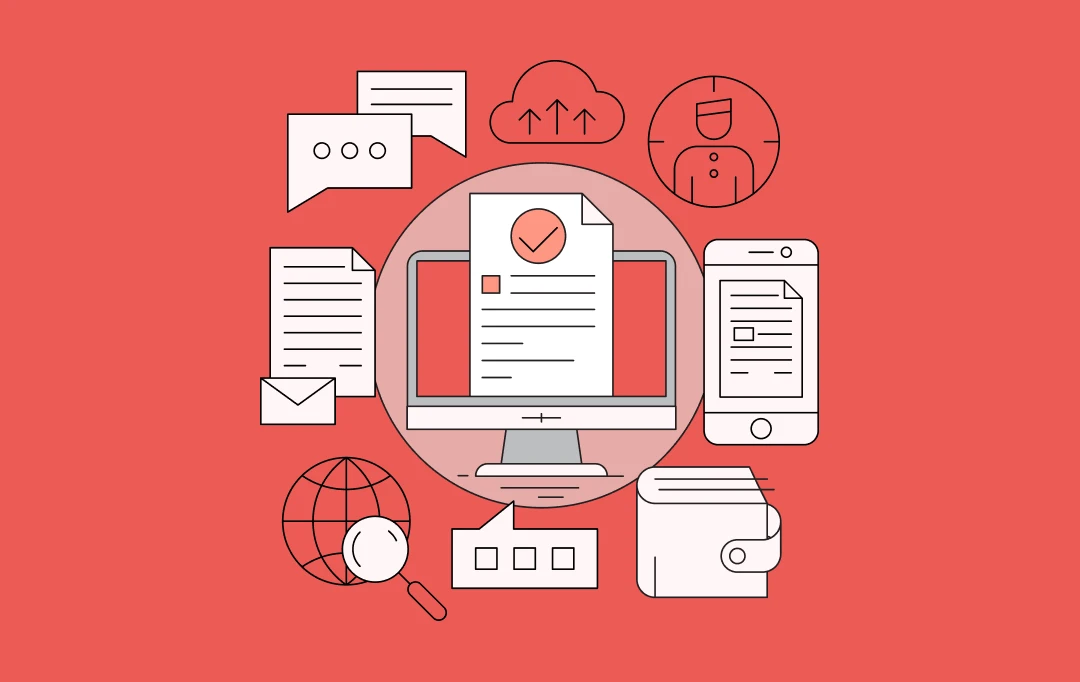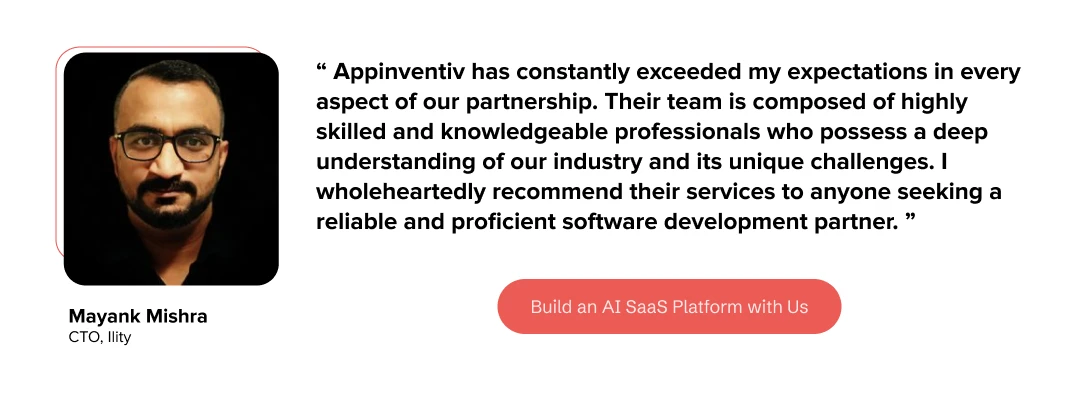- Why AI and SaaS is a Game-Changing Combination
- How to Develop an AI-Powered SaaS Product?
- Identify the Problem and Plan Accordingly
- Define the AI SaaS Features
- Outsource Your Project to an AI SaaS Development Company
- Choose Tech Stack
- Develop the Minimum Viable Product (MVP)
- Focus on Security and Compliance
- Test for Quality Assurance
- Iterate and Improve
- How Much Does It Cost to Build an AI SaaS Product?
- Factors Affecting AI SaaS Product Development Costs
- Features and Complexity
- Platform Choice
- Technological Architecture
- UI/UX Design
- AI SaaS Category
- Development Team Location
- Ongoing Maintenance and Updates
- Real-World Examples of AI SaaS Platforms
- Salesforce
- Ility
- Challenges and Solutions in AI SaaS Platform Development:
- Data Privacy and Security
- Scalability
- Integration Complexity
- Ethical Considerations
- Future of AI SaaS Product Development: What’s Next?
- Leverage Appinventiv’s Expertise in Artificial Intelligence SaaS Product Development
- FAQs
The future of business is here and has been redefined by artificial intelligence (AI). AI has been a buzzword in the modern business world, and this is nowhere more evident than in Artificial Intelligence as a Service or AI SaaS products. AI has a revolutionary impact on SaaS platforms, making traditional applications more efficient and responsive to diverse user needs.
Its integration in SaaS enhances automation, streamlining workflows, providing deeper insights, and personalizing user experiences. By leveraging AI, companies can build advanced SaaS solutions that can not only address current challenges but also anticipate future needs, offering unprecedented growth, scalability, and adaptability. In short and simple terms, AI SaaS products are more than just software; they represent a transformative shift in how businesses operate, compete, and grow in today’s digital landscape.
The global AI SaaS market was estimated at $71.54 billion in 2024 and is expected to reach a market value of $775.44 billion by 2031, expanding at a CAGR of 38.28% from 2024 to 2031. The number is immense and increasing. This unprecedented market growth highlights the growing demand for AI SaaS products, making organizations consider building one for their business and evaluating AI SaaS product development costs.
Still unsure why artificial intelligence saas product development is a critical investment for businesses looking to lead in their industry? This blog will throw light on the importance of AI SaaS product development and how it can transform your business. Along the way, we will also guide you through how to build a SaaS product and delve into the critical components (details later) of cost estimation, helping you navigate the financial landscape of AI product development with clarity and confidence.
Why AI and SaaS is a Game-Changing Combination
The combination of AI and SaaS is redefining the technological landscape by making advanced AI capabilities more accessible and practical for a broad audience. Through cloud-based platforms, AI SaaS solutions provide powerful AI tools via a free or subscription model, removing barriers such as high initial costs and the need for specialized expertise.
This approach is based on the principles of scalability, cost-effectiveness, and customization, enabling companies of all sizes to leverage the power of AI without substantial upfront investments or specialized expertise.
What’s more? AI SaaS platforms, with their predictive analytics capabilities, offer actionable insights, helping businesses make data-driven decisions and gain competitive advantages.
Unsurprisingly, AI SaaS is spearheading a new wave of innovation and operational efficiency, empowering organizations to leverage the best of both worlds: SaaS’s accessibility with AI’s revolutionary capability.
How to Develop an AI-Powered SaaS Product?
AI-powered SaaS product development is a complex and challenging process that involves a deep blend of advanced technologies, cutting-edge features, and the expertise of a SaaS development company. Here is a step-by-step guide to help you navigate the AI SaaS product development process:
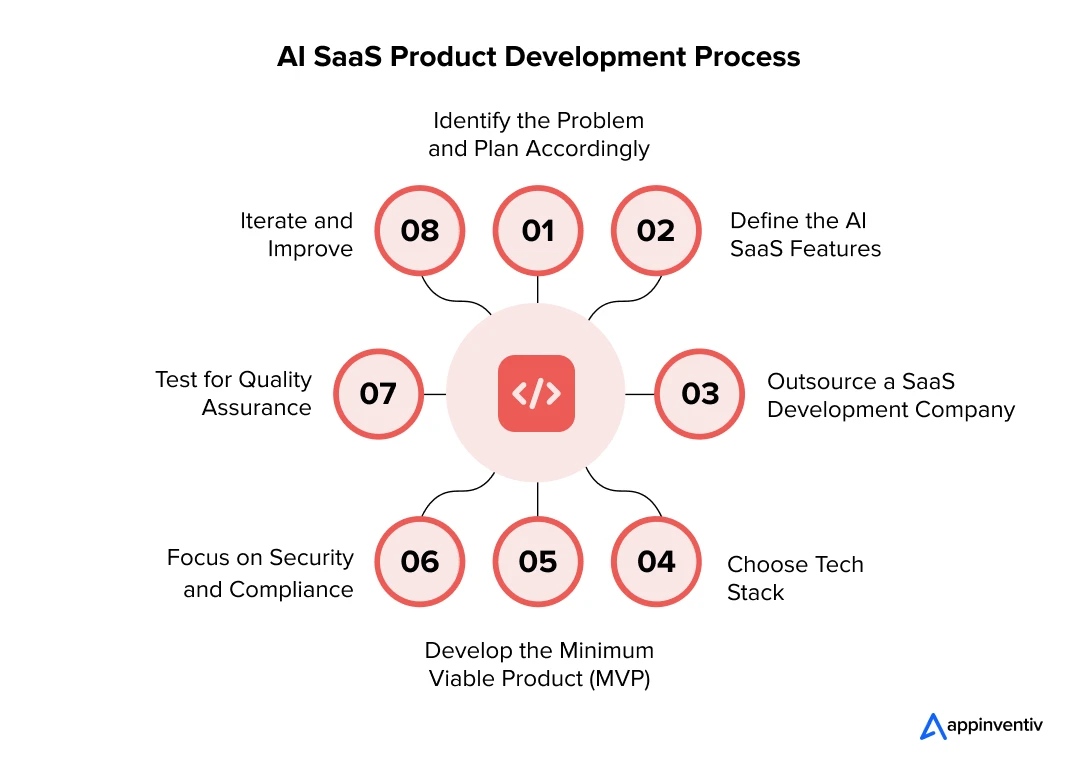
Identify the Problem and Plan Accordingly
The first step of the AI SaaS product development process starts with conducting thorough market research to identify a specific problem or need that your AI-powered SaaS product can address. However, identifying the problem is just half of the solution. You also need to understand your target audience, their pain points, and the value your SaaS solution brings to the table.
Define the AI SaaS Features
After knowing the problem, the next step is to outline what functionalities your AI SaaS product should serve. Prioritize features like user authentication, access control, data storage and management, automation, AI chatbot, auto-scaling, etc. Simultaneously, define the SaaS architecture, ensuring it supports scalability, flexibility, and ease of integration. As your user base grows, your infrastructure should be able to handle increased demand without compromising performance.
Outsource Your Project to an AI SaaS Development Company
Your project’s success depends on outsourcing to the best SaaS development company with proven expertise in AI development. A reputed SaaS company like Appinventiv has a skilled team of AI developers, UI/UX designers, data scientists, project managers, etc., who work diligently to build a SaaS product for your business.
Also Read: AI in Action: 6 Business Case Studies on How AI-Based Development is Driving Innovation across Industries
Choose Tech Stack
Choosing the right tech stack is the backbone of your Saas product development. You should choose a technology stack that supports AI integration and cloud deployment. Consider frameworks like TensorFlow or PyTorch for AI development and cloud platforms like AWS, Azure, or Google Cloud for SaaS hosting.
Here is a table outlining the right tech stack options required for AI SaaS development:
| Category | Tech Stack Options |
|---|---|
| Frontend Design & Styling | Tailwind CSS, Bootstrap, Bulma, MUI, Shadcn/ui |
| Frontend Frameworks | React JS + Vite, Vue JS, Angular, Svelte |
| Backend Development | Nest JS, Express JS, Rust Rocket, Django, Beego, Laravel |
| Database | MongoDB, PostgreSQL, PlanetScale DB, Timescale DB, Redis, |
| Cloud & Hosting | Fly.io, DigitalOcean, Linode, Azure, AWS, GCP |
| AI/ML Models | OpenAI GPT, Google Gemini, Nitro, Jan.ai, LLAMA |
| No-Code Tools | Bubble.io |
| APIs & Communication | REST APIs, GraphQL |
Develop the Minimum Viable Product (MVP)
Now that you have an idea, a development team, and a tech stack for custom AI SaaS product development, it is time to turn your vision into a seamless reality. But before you dive deep, start with MVP development that focuses on the core features of your product. This allows you to test the AI functionalities and SaaS performance with real users, gathering feedback to iterate and improve.
Focus on Security and Compliance
Security and compliance are the most integral steps of the development process of AI-based SaaS products. You must ensure that your AI SaaS product adheres to industry standards and guidelines for data security, particularly when handling sensitive information. Implement robust security measures and stay updated on regulatory requirements.
Test for Quality Assurance
Before launching your AI SaaS product, it is crucial to conduct comprehensive testing to ensure both the SaaS platform and AI functionalities work seamlessly. Leverage user feedback and data analytics to identify any areas for improvement and optimize the platform to enhance efficiency and user satisfaction.
Iterate and Improve
Once your product is ready, launch it to the market to gather user feedback. After launching the MVP and receiving positive feedback, the next step is scaling your AI-powered SaaS product. Scaling includes adding new features, incorporating emerging trends, and preparing the product to manage growth across users, data, and functionalities.
Also Read: Custom Software Development: The Ultimate Guide for 2024
How Much Does It Cost to Build an AI SaaS Product?
On average, AI SaaS product development costs between $35,000 and $400,000+. However, this is just a rough estimate. The actual cost can increase or decrease depending on your unique project requirements and a variety of other components. These components include the complexity of the AI algorithms, the scope of the SaaS features, the UI/UX design of AI SaaS platforms, and the technology stack used.
Additionally, factors such as the location of the development team, ongoing maintenance, and scalability needs can further affect the final AI SaaS product development cost. Let’s discover these cost-determining factors in detail to get a more accurate estimate for AI SaaS product development for business.
Factors Affecting AI SaaS Product Development Costs
There are several factors that can impact the cost of developing an AI SaaS product, each contributing to your budget for implementing AI in SaaS product development in different ways.
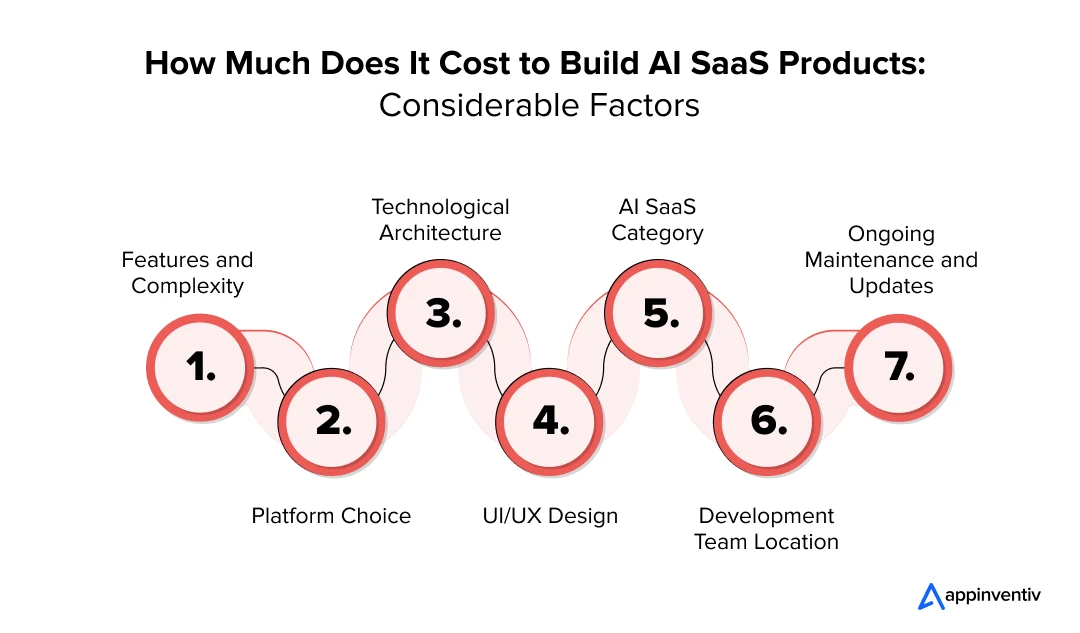
Features and Complexity
The more complex your AI SaaS product is, the higher it will cost. For instance, extensive AI functionalities such as advanced machine learning algorithms, natural language processing (NLP), predictive analytics, computer vision, or real-time data processing will also add to the expenses.
Here is a table outlining the cost to build AI SaaS products based on the project’s complexity and features
| Platform Complexity | Average Timeline | Average Cost |
|---|---|---|
| Simple product with basic features | 4-6 months | $35,000-80,000 |
| Medium complex platform with moderate features | 4-9 months | $80,000-$200,000 |
| Highly complex systems with advanced features | 9 months to 1 year or more | $200,000-$400,000 or more |
Platform Choice
The platform on which your AI SaaS product will be deployed can significantly impact AI SaaS product development costs. Whether you choose to build for web, mobile, or a combination of platforms, each requires specific design, development, and optimization efforts. Additionally, cross-platform compatibility can also impact development costs.
Technological Architecture
The underlying architecture of your AI SaaS product, including cloud infrastructure, microservices, and database management, plays a significant role in determining AI SaaS product development costs. A secure and scalable architecture requires higher investment but ensures long-term stability and performance.
UI/UX Design
Creating an intuitive and engaging UI/UX ensures higher user adoption and engagement. However, it can also add to the development cost. A well-designed UI/UX requires careful planning, iterative design processes, and expensive elements, which can increase both time and development costs.
AI SaaS Category
The cost of developing an AI SaaS product can differ significantly depending on the platform’s category. Various AI SaaS applications come with distinct features, serve specific purposes, and have unique requirements. Consequently, development costs are influenced by the complexity of features, the benefits offered, and the specific use cases of AI SaaS product development.
Here is a breakdown of the AI-powered SaaS product development cost as per the different platform types:
| Industry Category | Features and Use Cases | Estimated Cost Range |
|---|---|---|
| Accounting | Financial management, bookkeeping, and compliance. | $35,000 – $150,000 |
| eCommerce | Personalized shopping experiences, inventory management, and customer insights. | $40,000 – $200,000 |
| Healthcare | Patient management, diagnostics, and telemedicine. | $50,000 – $250,000 |
| Finance | Trading algorithms, risk assessment, and fraud detection. | $40,000 – $300,000+ |
| Education | Personalized learning, virtual classrooms, and administrative tasks. | $35,000 – $150,000 |
| Manufacturing | Predictive maintenance, supply chain optimization, and process automation. | $35,000 – $180,000 |
| Real Estate | Property valuation, market analysis, and customer engagement. | $40,000 – $160,000 |
| Legal | Document analysis, case management, and legal research. | $30,000 – $160,000 |
Development Team Location
The location and expertise of your SaaS development team play an integral role in determining costs. Hiring a highly skilled team from regions like the UK, US, or Australia generally results in higher development expenses compared to teams based in Asia, India, or Eastern Europe.
Here is an estimated hourly rate of developers in different regions:
| Region | Price Range |
|---|---|
| North America | $40–250/hr |
| Australia | $35–150/hr |
| Western Europe | $35–180/hr |
| South America | $25–120/hr |
| Eastern Europe | $25–110/hr |
| India and Asia | $20–80/hr |
Ongoing Maintenance and Updates
Post-launch, the product will require regular updates, AI model retraining, and system maintenance to remain up-to-date and competitive. You must consider these ongoing aspects when evaluating AI SaaS product development costs.
Related Article: Intelligent App Development Cost Estimation Guide
Real-World Examples of AI SaaS Platforms
Now that we know how to develop an AI-powered SaaS product and the budget required, let’s explore some real-world AI SaaS platforms that have gained immense success. These examples highlight how innovative companies leverage the power of AI to transform their operation and deliver cutting-edge solutions to their users.
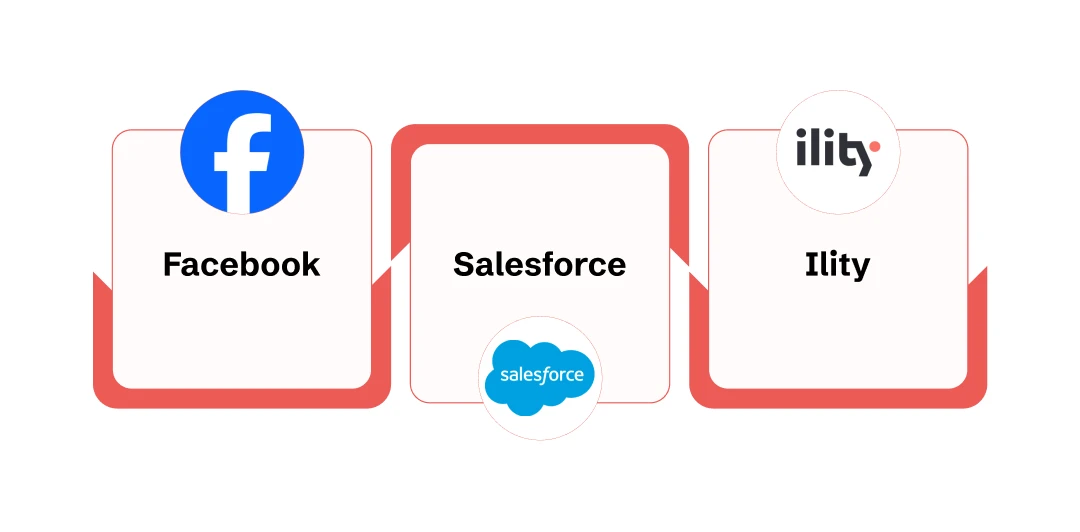
A prime example of an AI SaaS platform is Facebook, which showcases the transformative potential of integrating AI into a cloud-based SaaS solution. Beyond its extensive range of features—encompassing messaging, social networking, and even a vibrant marketplace—Facebook leverages AI to enhance user interactions, personalize content, and drive engagement. This integration highlights how AI SaaS platforms can evolve to offer a comprehensive suite of tools, transforming how users interact with digital environments and access a range of services from a single platform.
Salesforce
Salesforce exemplifies a leading AI SaaS platform that offers cloud-based customer relationship management (CRM) solutions and integrates AI through Salesforce Einstein. By leveraging AI-driven insights, Salesforce helps businesses optimize sales strategies, automate workflows, and personalize customer interactions. This seamless integration of AI into its cloud-based platform demonstrates how AI SaaS can revolutionize enterprise operations, deliver data-driven insights, and improve customer engagement.
Ility
Another popular example of a successful SaaS application is Ility — a comprehensive real estate SaaS platform created by Appinventiv. Our team modernized Ility’s user experience, designed a scalable architecture, and integrated advanced features for property management and client interactions. These enhancements led to a 40% increase in occupancy rates and a 20% rise in landlord ROI.
Ility’s success has established it as a cutting-edge solution in the real estate industry, streamlining operations and enhancing user satisfaction. Moving forward, we plan to enhance Ility further by integrating advanced technologies, including GPT-4, blockchain, NLP, and machine learning, to drive even greater innovation and performance.
Challenges and Solutions in AI SaaS Platform Development:
Navigating the development of AI SaaS products presents some critical challenges that require strategic solutions. Addressing these hurdles is crucial for secure and scalable product development.
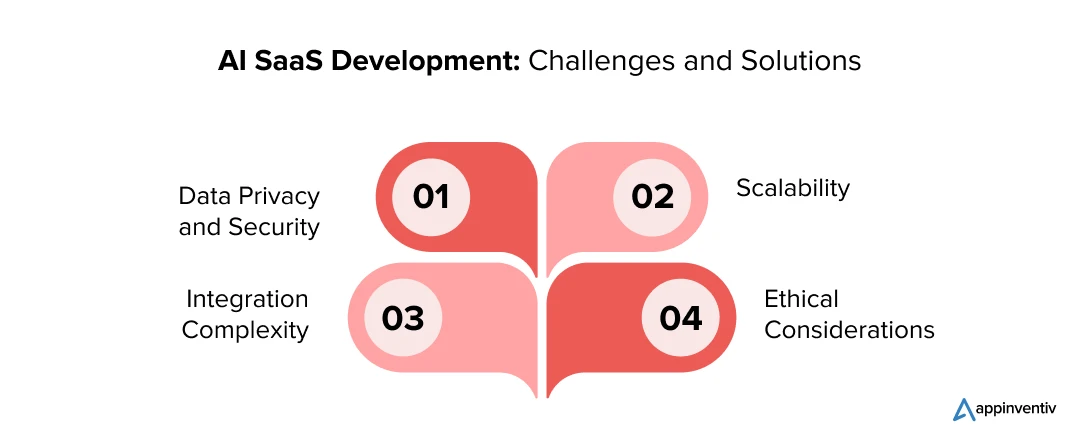
Data Privacy and Security
Challenge: Cloud platforms are often vulnerable to cyber-attacks. Thus, protecting sensitive user data from breaches and maintaining compliance with data protection laws is a real challenge.
Solution: Implement robust security measures such as encryption protocols, multi-factor authentication, etc. additionally, adhere to industry compliances such as GDPR and HIPAA.
Scalability
Challenge: One of the biggest challenges for custom AI SaaS product development is managing the platform’s ability to handle increased user loads, data volumes, and feature expansions without compromising performance.
Solution: Design the platform with a microservices architecture and utilize cloud-based solutions with auto-scaling features. It will help scale up your AI SaaS product and maintain high performance as demand fluctuates.
Integration Complexity
Challenge: Integrating a cloud-based AI SaaS platform with existing systems and ensuring compatibility with various technologies can be a real pain. Poor integration can lead to data silos, creating barriers to effective communication between systems.
Solution: Use standardized APIs and middleware to facilitate smooth integration. A modular system architecture and adherence to common protocols can simplify the integration process and enhance system interoperability.
Ethical Considerations
Challenge: Addressing ethical issues related to AI, such as bias, privacy, and accountability, is a major challenge in AI SaaS development.
Solution: Prioritize transparency in AI SaaS development to ensure responsible AI deployment and build user trust. Also, regular audits should be conducted to identify and mitigate biases in AI models.
You may like reading: A complete guide on cloud-based application development
Future of AI SaaS Product Development: What’s Next?
The future of AI in SaaS is poised to be transformative, driving innovation and offering businesses powerful tools to enhance productivity, efficiency, and customer satisfaction.
As AI technologies like advanced NLP, ML, and computer vision evolve, SaaS platforms will use these advancements to offer more personalized experiences, automate complex tasks, and provide deeper insights with smarter business intelligence tools. This AI integration will not only enhance the functionality of SaaS platforms but also drive their market value by attracting more investment and keeping users engaged longer.
What’s more? Established SaaS companies, such as Salesforce, will intensify their integration of AI to maintain a competitive edge, driving a wave of AI-powered upgrades across their product offerings.
However, the rise of AI-driven SaaS also brings potential risks, such as data privacy concerns, over-reliance on AI insights, and the challenges of integrating AI into existing systems. Companies will need to address these risks carefully to maximize the benefits of AI while maintaining trust and security. As AI advances, it will fuel major innovations in SaaS, leading to new market opportunities and ensuring that AI-enabled SaaS platforms remain competitive in the tech-driven age.
Also Read: A Detailed Guide on How to Get Your SaaS Business on Mobile Apps
Leverage Appinventiv’s Expertise in Artificial Intelligence SaaS Product Development
An AI SaaS product offers numerous advantages over traditional SaaS solutions, including automation, scalability, global accessibility, and enhanced security. However, the journey from an AI SaaS product idea to a scalable product is not easy. It requires careful planning, a strong focus on user needs, and expert assistance from an AI development company.
So, if you are looking for an experienced tech team who can bring your AI SaaS vision to life, Appinventiv is here to help. With a proven track record in developing innovative AI and cloud solutions for various industries, we are adept at creating AI SaaS solutions tailored to meet your stringent business requirements.
Let’s get a glimpse of our expertise in leveraging cutting-edge technologies like IoT, AI, cloud, etc., and building successful SaaS applications.
DiabeticU: A prime example of our expertise is our partnership with DiabeticU, where we tackled scalability challenges, revamped the user interface for better usability, and introduced new features that significantly improved patient engagement and data accuracy. This transformation has empowered users to take control of their health, and DiabeticU has gained significant traction in the healthcare sector.

YKA: Another noteworthy project is YKA, a leading retail and distribution platform in Bahrain. Appinventiv collaborated with YK Almoayyed to build a scalable retail and distribution platform that enhanced operational efficiency and customer engagement. The solution was designed with robust data security measures, ensuring the safe handling of sensitive information while supporting seamless scalability as the business grew. This transformation enabled YK Almoayyed to modernize its operations and maintain a competitive edge in the market.
Avatus: A standout example of our cloud-based product development is Avatus — an avatar-based social networking platform. As industry leaders in product development services, we designed and developed a scalable infrastructure, implemented sophisticated AI algorithms for personalized content, and integrated interactive features that set Avatus apart in the social networking space. This innovation has attracted a diverse user base and positioned Avatus as a leader in avatar-based social networking.
No matter if you want to build a similar SaaS product or just want to know AI SaaS product development cost, contact us, and we will be happy to assist you with your specific requirements
FAQs
Q. How much does it cost to develop an AI SaaS product?
A. The cost to develop an AI SaaS product typically ranges from $30,000 to $300,000 or more, depending on factors like complexity, features, AI model integration, and specific business requirements.
To get a more precise estimate for AI SaaS product development costs, discuss your project idea with us and get a tailored quotation.
Q. What is the timeline for artificial intelligence SaaS product development?
A. The timeline for developing an AI SaaS product generally ranges between 4 months to a year or more. This timeframe can vary based on several factors, such as the project’s complexity, the integration of AI models, the number of features required, the expertise of the development team, and the iterative testing process.
For a more precise estimate of the AI-powered SaaS product development timeline, connect with our efficient AI experts.
Q. What are the benefits of AI SaaS product development?
A. An AI SaaS product offers numerous advantages. Some of the most common benefits of AI SaaS product development are:
- Enhanced Efficiency: The integration of AI in SaaS product development helps automate routine tasks and streamlines processes, improving operational efficiency.
- Personalization: It delivers personalized experiences based on individual user preferences and behaviors.
- Data-Driven Insights: AI SaaS products provide actionable insights through advanced data analysis, enabling informed decision-making.
- Scalability: SaaS products are made with cloud capabilities. Thus, it can easily adapt to growing user demands, ensuring consistent performance as your business expands.
- Competitive Edge: The integration of AI and cloud in your business software helps you stay ahead in the competitive landscape.
- Strengthened Security: AI SaaS platforms implement robust security measures to protect sensitive data and ensure compliance.
Q. What is an AI SaaS product?
A. An AI SaaS product is a cloud-based software solution that integrates artificial intelligence to provide advanced functionalities, such as automation, data analysis, and personalized user experiences, accessible via the Internet.


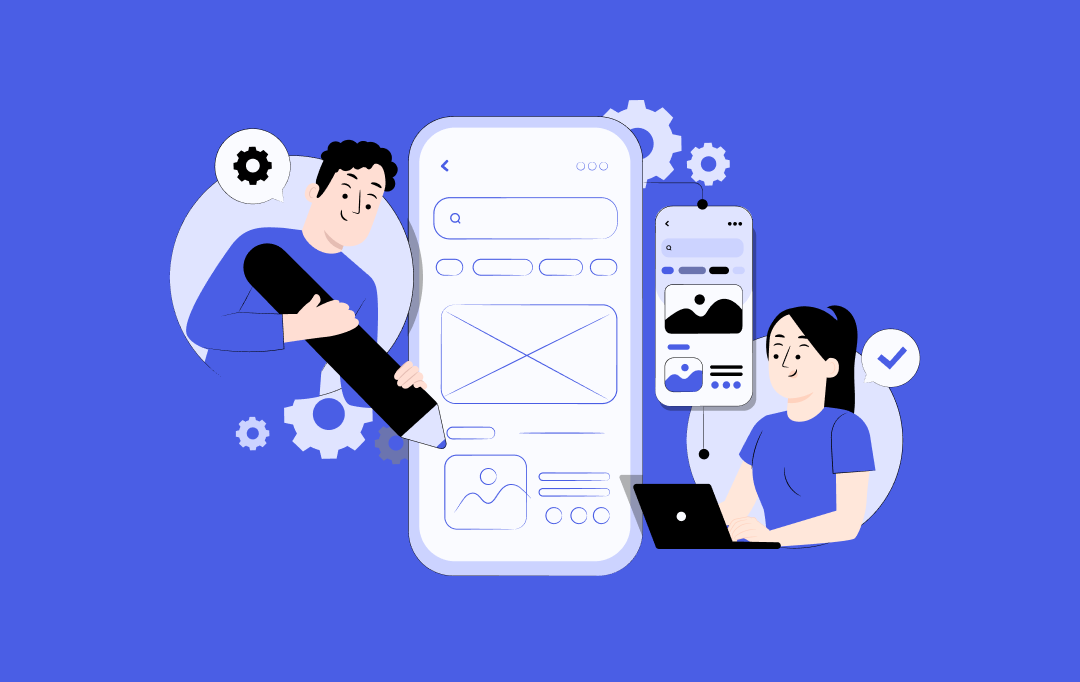
How Much Does It Cost to Build an App like Janitor AI?
Key takeaways: Cost Breakdown: The cost of app development varies, with an MVP App costing $40,000 to $90,000, a Mid-Tier App costing $100,000 to $200,000, and an Enterprise Grade App costing $300,000 to $ 500,000 or more, depending on features, complexity, and the expertise of the development team. Key Factors: Platform choice, AI integration, and…
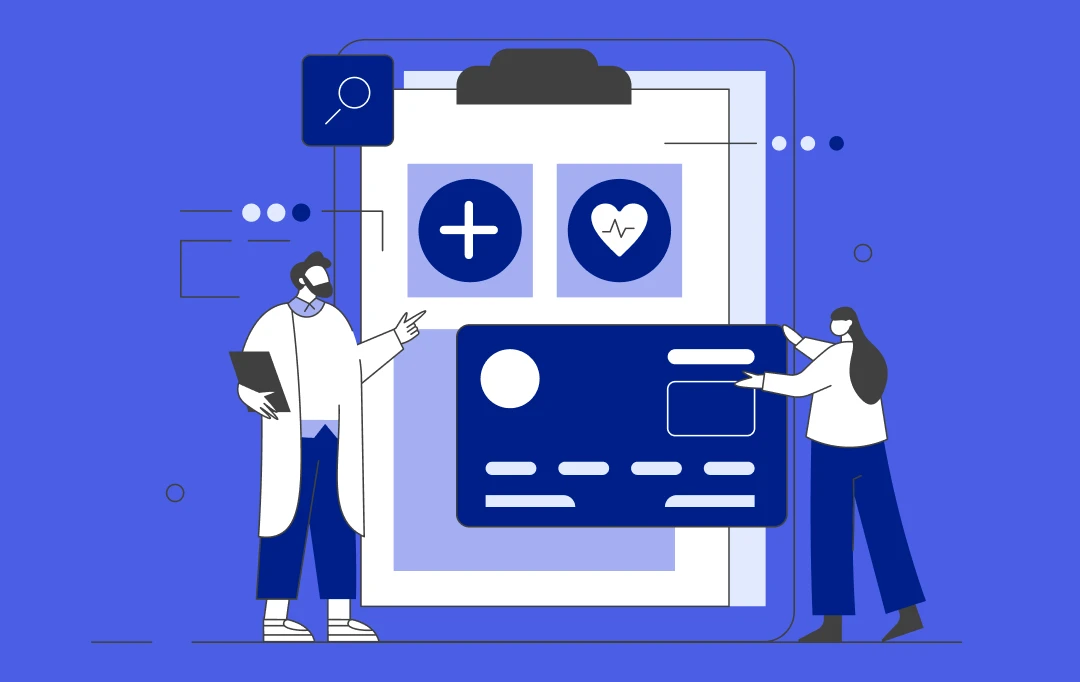
10 Ways AI is Transforming the Healthcare Sector in Australia
Key takeaways: Generative AI could add $13 billion annually to Australia’s healthcare sector by 2030. AI is already transforming operations across diagnostics, admin tasks, and patient care. Healthcare in remote areas is improving with AI-powered virtual assistants and monitoring tools. AI can help address workforce shortages by automating routine tasks and supporting clinical decisions. Major…
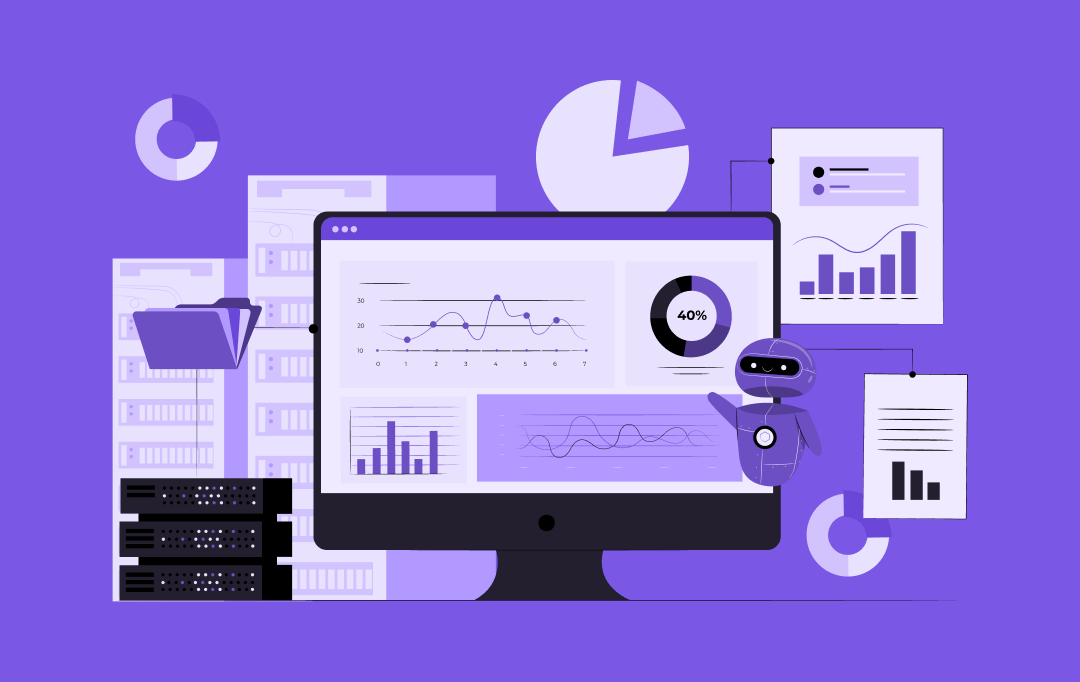
Exploring the Power of AI in Creating Dynamic & Interactive Data Visualizations
Key takeaways: AI transforms data visualization by providing automated insights, interactive dashboards, and NLP, thereby tackling revenue loss and improving data quality. Key features include predictive analytics, real-time data integration, and user-friendly visualizations, enabling faster and more informed decisions. Top 2025 tools, such as Tableau, Power BI, and Julius AI, offer NLP and real-time analytics…






